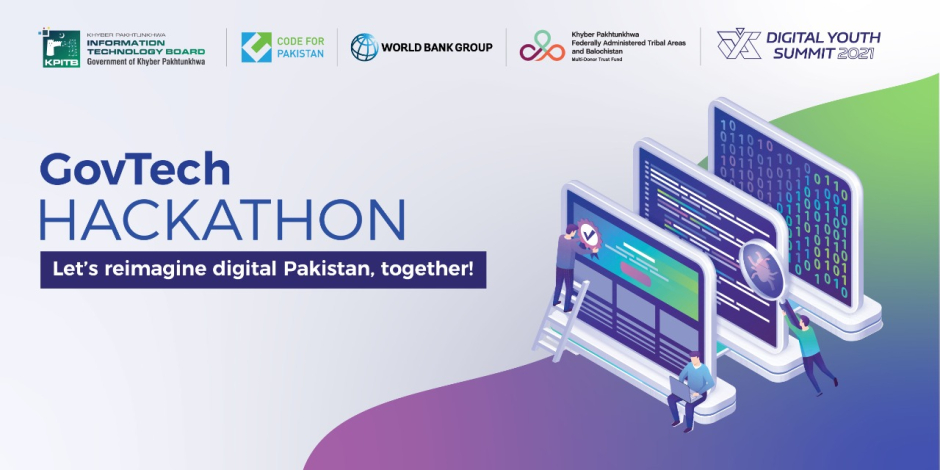After a week-long marathon of developing tech solutions to complex challenges, working with speakers and mentors to refine ideas and pitches, and the presentation of solutions to a panel of judges, Code for Pakistan, KP IT Board, and the World Bank are concluding the GovTech Hackathon today and have announced the winners on social media.
Winning first place in the GovTech Hackathon is Boltay Huroof, a team co-founded by H S Umer Farooq and Tabish Rafiq with a solution that translates text into braille. Their project was inspired by a teammate’s brother, who had to study without books because the international software that currently exists did not support the translation of local and regional languages into braille.
Regarding his team’s win, co-founder Umer said, “There were so many great ideas and projects that were submitted for the GovTech Hackathon — there was a tough competition, which is partly why we are thrilled and honored that the judges decided to award us with the top prize! It feels amazing to win, but also, it feels even better to know that there are so many like-minded Pakistanis out there who are trying to make our country more inclusive and equitable, and I hope that KP IT Board, Code for Pakistan, and the World Bank continue to invest their energies into developing more opportunities like this one.”
Coming in second place are Eisha Tir Raazia, Mahnoor Imtiaz, Muhammad Hassan Ahmed, Maria Ahmed with their app Drive(H)er, which tackles the safety issues women face while commuting by creating a ride-hailing service that is “for her, by her” and organizing female carpooling communities on social media platforms. In third place, Hidayat, designed by Mahwish Nazli, Amna Afzal, Azeem Abbas, is a platform that aims to connect student counselors with students from all over Pakistan in one place at the click of a button through the integration of AI.
“We are proud to have promoted and developed this initiative with KP IT Board and the World Bank — it has been a fruitful and fulfilling collaboration founded upon our mutual goal of creating sustainable solutions for government and citizens,” said Samina Rizwan, Code for Pakistan’s Country Head. “It is also indicative of our faith in the brilliance of young Pakistanis, and of our deep commitment to investing in their innovative ideas.”
Over 1300 individuals applied from 130+ cities, representing remote areas such as Arifwala, Barikot, Bhera, Chakdara, Dahranwala, Hangu, Hujra Shah Muqeem, Jampur, Jaranwala, Matli, Mehar, Pabbi, Pishin, Paharpur, Talagang, Topi, Vehari, and Zafarwal. Over 50 projects were submitted, of which 15 were shortlisted and presented to an esteemed panel of judges, which included Dr. Ali Mahmud (KPITB); Haroon Kanth (Teradata Consulting); Samina Rizwan (CfP), Shan Rehman (World Bank), and Abu Bakar Alvi (RADEC Technologies), who decided the winners.
Haroon Kanth, Managing Director, Teradata, and judge for this year’s GovTech Hackathon, said “This is a great initiative to find solutions to problems that exist in our daily lives, especially those that pertain to services that can be collaborated on with the government. The use of tech is inevitable, and I’ve seen all using tech as a key enabler in recommending solutions to public issues. The ideas we heard were innovative and the presenters were passionate about contributing back to society. 4 hours [of judging] well spent!”
“I think this is the right time to support entrepreneurial ventures in Pakistan considering the traction our startups are getting in the international market,” added Abu Bakar Alvi, Principal Consultant at Radec Technologies. “I think ventures like GovTech Hackathon provide an excellent platform for budding entrepreneurs. I appreciate the efforts of the team and congratulate them on this excellent initiative.”












